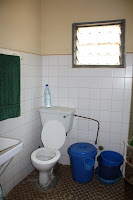Every day, I have reason to reflect on how fortunate we who live in the west are. In Canada for instance, when a woman loses her husband, friends and relatives gather to support her, comfort her and see to her needs. Food appears at the doorstep for the family, and there is always someone to make phone calls, accompany her to the funeral home, and essentially take care of day to day stuff.
Not so in Cameroon (and other African countries). The traditional tribal system is still very strong and holds customs that frequently work against the widow. Widows are often blamed for the death of the husband and submitted to quite cruel treatment.
The husband is the protector of the family. He may also be the income earner but as polygamy is still common, there may be many wives, each in their own small house and each responsible for the care of the children. Many are involved in subsistence farming or other minor income generation. Most cannot afford to pay children’s school fees.
Upon the husband’s death, the widow loses her protection. Most often, in town as in the villages, there is no marriage certificate, that being a process of modern society. Similarly, there is no birth certificate for the children. Therefore, even if laws exist to protect widows and orphans, there is no means of proving that you were actually married or that the children are legitimate. Too often, widows and their children are disenfranchised and left with nothing, including their homes, property and any means of support.
The situations can be very desperate. It leads some of them to prostitution – “sell one part to feed another” they say. Or, as in many tribal societies, the brother in law takes the woman as his own, whether she wants him or not.
There are many rituals around death and burials which we would consider nothing short of barbaric. These vary depending on the tribe and location.
• The widow may not be allowed out of the house for several days following the death.
• She may be locked up for days or hours with the corpse.
• She may have no say in funeral arrangements.• She may be forced to sit on the floor for the duration of the mourning.
• She may not be allowed to bathe and forced to wear the same clothes during the whole mourning period.
• She may be forced to eat meals from leaves.• She may be forced to shout and cry every morning before and after the burial.
• She may be made to dance half naked around her husband’s body
• She may even be made to drink unusual concoctions, the worse of which is the water that has been used to wash the body.
Please remember that only some of these practices will be common in any one village. Also, traditional rulers are gradually becoming aware of the injustice and slowly changing some of the practices.
Women are fighting to have their rights recognized in Cameroon. Although these are enshrined in law, they are not honoured in most tribal villages. That being said, there is progress to be seen, with women occupying leadership positions and/or owning businesses. But much more has to be done.
There is great need to support widows, empower them and provide them with basic needs to restart their lives. This is what Hope for the Widows and Orphans, my organization, does and I am fortunate to work for such a worthwhile cause.























